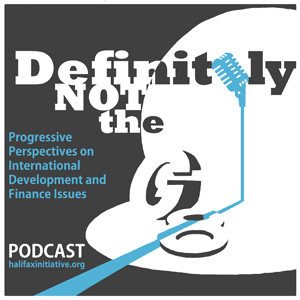The Financial Transactions Tax (FTT)
Part 1
Part 1
ODA accountability consultation; World Bank dumps human rights; Bank report on extractives ignores reality.
 |
Final script May 22, 2010; release date June 18, 2010. |
2010 G8/G20 Canadian Civil Society Coordinating Committee
Parliamentary Roundtables on the G8/G20 Agendas
Tuesday, April 27th, 2010 9:00 am - 11:00 am Room 2-2, National Press Building, 165 Sparks Street, Ottawa
Introduction
The Official Development Assistance (ODA) Accountability Act (ODA Act) came into force on June 28, 2008. This now legally requires Canadian ODA to contribute to poverty reduction, take into account the perspectives of the poor, and be consistent with international human rights standards. Over the past year, the Canadian International Development Agency (CIDA), Foreign Affairs Canada (FAC), and Finance Canada have been developing plans on how to interpret and implement the Act. To date, only Finance Canada has held a consultation on the Act, with neither CIDA nor FAC disclosing its plans. Consultations must be held before September 30, 2009, when CIDA is expected to release the first annual report on the Act.
Letter to the Editor - Embassy, July 9, 2008
World Bank’s CSR Praise Met with Cynicism in Light of Gov’t Stalling
The World Bank and the Canadian government are not unalike (RE: “World Bank Applauds Canada’s Americas Focus,” June 25). Both initiated a process to respond to complaints from civil society and communities about the negative human rights, environmental and economic impacts of publicly-funded extractive projects. In the World Bank’s case, it was the Extractive Industries Review (EIR). In the Canadian case, it was the National Roundtables on Corporate Social Responsibility (CSR) and the Canadian Extractive Industry in Developing Countries.
Global food crisis, Bank and IMF respond
While discussions of the World Bank’s new role in the “business” of climate change (see New Publications), the IMF’s new deal on quota reform (see JUST THE FACTS) and financial market turmoil looked set to top the agenda at the Bank and IMF’s Spring Meetings, it was mounting concern over the global food crisis that dominated discussions.
On April 26th, NSI President, Roy Culpeper, and KAIROS Canada's Global Economic Justice Coordinator, presented their views on the issues raised by the Government’s annual report on the Bretton Woods Organizations (the International Monetary Fund and the World Bank) before members of the Standing Committee on Foreign Affairs and International Development (SFAIT). The meeting was called by the Standing Committee in response to a request by the Halifax Initiative Coalition.
Groundswell of Interest in Canadian Overseas Extractive Operations
This month the Government of Canada’s final roundtable on Corporate Social Responsibility and the Canadian Extractive Industry in Developing Countries was held in Montreal (see April 2006, Issue update). In order to accommodate public demand, more time was dedicated to public sessions in the November roundtable than in any of the previous consultations. Roundtable participants heard diverse perspectives from an impressive range of stakeholders. An Indonesian speaker described how her community is affected by the operations of a Canadian mining company. John Ruggie, the Special Representative of the Secretary-General on business and human rights also addressed roundtable participants.
Recieved July 8, 2005
Mr. John Mihevc
Chair
Halifax Initiative Coalition
104 - 153 Chapel Street
Ottawa, Ontario KIN 1H5
Dear Mr. Mihevc:
As Minister of International Cooperation, I am pleased to respond to your letter to the Prime Minister, concerning Canada's international assistance efforts.
Financial taxes are complex matters, especially when they are meant to generate additional revenues for development and not, like past proposals such as the Tobin tax, to reduce market volatility. This is why my colleague, the Honourable Ralph E. Goodale, Minister of Finance, and I requested, at the World Bank and International Monetary Fund meetings last October, that their staff conduct technical studies on the potential impact of various innovative financing proposals.